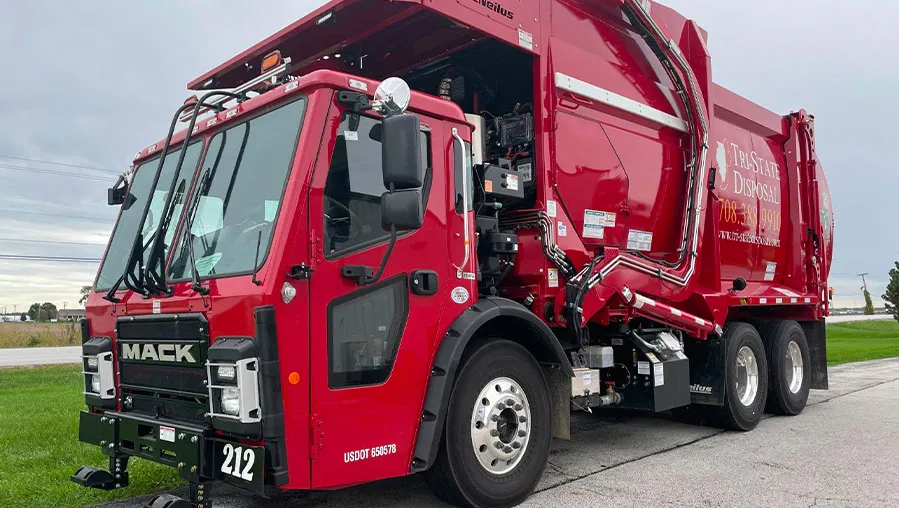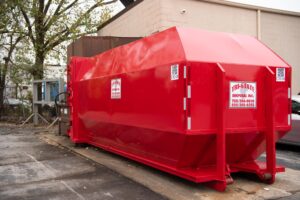Could your business benefit from switching to a trash compactor rather than a regular dumpster or roll-off? The answer depends on a variety of factors. But finding the right waste solution for your particular operation could save money and time while protecting the reputation of the business. To help you with this decision, here are a few questions to answer.
Is Your Trash a Good Candidate?
Before you investigate any further factors, start by determining if your trash is the right type for a compactor. Dumpsters simply contain waste as-is until it’s collected for the landfill, incinerator, or recycling. However, compactors actively compact this waste to make it smaller while it waits for disposal.
To benefit from the switch to compactors, the ideal waste is light and bulky with plenty of space to be compacted. Some of the best examples are large cardboard boxes, discarded packaging material, and lightweight manufacturing castoff. On the other hand, if it won’t compact well, it may not be worth the extra effort and you should focus on other solutions.
What Problems Do You Want to Solve?
What are your current challenges when it comes to waste management? Do you want to reduce costs? Is your garbage area messy and unappealing? Do trucks have a hard time reaching and safely emptying the waste?
First identify your goals so you can find the best solution for them. Perhaps you want to make your garbage storage area less unsightly for customers and passers-by. In this case, an enclosed compactor which reduces the load could help a lot.
Can a Compactor Lower Expenses?
The main advantage of compactors is their ability to lower the physical volume of trash that must be hauled out. Find out if this will save your company enough money to make the switch cost-effective. Based on how much more compact it can make your particular type of trash, you could reduce volume by half or more. This may mean half or fewer pickups and trips to the landfill.
However, you also pay more for a compactor than for a more static dumpster. Crunch the numbers to determine if fewer pickups and less mass saves more money than you may expend with the new units. If your business rises and falls on seasonal cycles, you may want to average the cost savings over several months or a year.
Do You Have Wet or Dry Waste?
What kinds of waste does your business produce? Wet and dry waste offer different challenges which can be best met by different equipment.
Along with reducing waste volume, compactors are known for their increased seals against leaking. So a food business that may or may not benefit financially from the compactor could still find that it helps keep all that food and liquid waste out of sight. Predominantly dry waste, on the other hand, may be contained sufficiently in a traditional dumpster unless the volume continues to grow regularly.
What Size Is Your Waste?
Compactors have two types of size requirements for the waste that goes in. The first, and most obvious, is how much garbage you generate. The more you need to throw out on a regular basis, the larger a unit you need. Many compactors come in sizes ranging from six cubic yards to forty cubic yards.
The other high-impact factor is how large the pieces of garbage are individually. While a dumpster simply holds everything within its walls, a compactor needs to run mechanical equipment that compacts the waste. Larger individual items may call for a larger overall compactor so the system can function properly.
Should You Buy or Rent a Unit?
If a compactor could be a smart expense for your business, you’ll next need to decide whether to buy or rent. Both have their pros and cons. When you buy a compactor, you pay it off and then use the machine at a very low cost for the remainder of its life span. However, you have to maintain it. And buying outright will tie up capital you could spend on other business needs.
Renting pushes off the cost and effort of maintenance and repairs to the actual owner of the compactor — the rental company. In return for a monthly rental fee, you can return it, exchange it, or scale it up or down at any time. And you keep more working capital by lowering your initial investment in the equipment and spreading it out into regular, stable rent payments.
Where Should You Start?
Begin making the best choice possible by meeting with the team at Tri-State Disposal. We’ve assisted Illinois businesses and organizations with all their waste disposal needs for more than a quarter century. We can help you assess and answer these questions and more. Call today to make an appointment or get answers to other questions you may have. No matter what you decide, your business will benefit.




